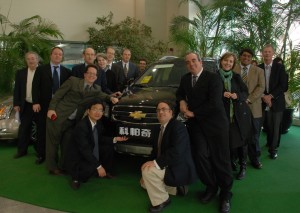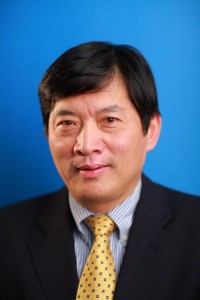General Motors: Chinese “People in Motion”
When David S. Chen wanted to catch a taxi to go to an airport in China back in December of 1981, there were so few autos on the road that he had to reserve a taxi one week in advance. In 2009, China became the world’s largest car market, surpassing the United States.
On Thursday, we spoke with Chen, vice president of General Motors’ China Group, and toured a Chevrolet factory at Pudong, located near Shanghai (Earlier in the week, our delegation visited Geely, China’s second largest domestic carmaker). He readily acknowledged that all of the world’s major automakers are in China today.
But GM has been one of the biggest success stories in the auto sector here. Its sales in China totaled $18 million in 2010, which was a 33.5 percent increase over the previous year. Industry sales growth through 2020 in China is expected to nearly equal growth in the next eight markets combined, including the United States.
When first started began working to establish GM programs in China in 1994, he said the company only had five employees. Now it has more than 35,000 employees at 11 assembly plants, four powertrain facilities and an R&D center.
When Chen – a Shanghai native — and others at GM first got started in China, the company rented half a floor at a Holiday Inn. “For a long time, my kids thought I worked at Holiday Inn,” he quipped.
There are now about 80 million cars on the roads of China, compared to more than 300 million in the U.S. Only 5 percent of people own a car here, while that figure is more than 80 percent in the states.
“That said, 80 percent of our buyers in China are first-time buyers, so the demand is pretty solid, and we expect continued growth in the near future,” Chen said.
Economic growth and a rising personal income also are helping, he said. China’s per capita income reached more than $4,000 and in larger urban areas such as Shanghai and Beijing it now exceeds more than $10,000.
The first GM vehicle produced in China, a Buick Century, came off the production line in December of 1998, and the following year the company sold 19,000 cars here. Last year, GM sold 2.35 million.
Chen said GM had to make more than 600 changes to the vehicles in the beginning to adapt to China’s needs. More example, there is more leg room in the rear of its Buick automobiles because most buyers sit in the back seat have chauffeurs.
“You might wonder why we picked the Buick,” he said. “It turned out that the last emperor owned a Buick. The last premier, Chou En Lai (China’s premier from 1949 to 1976), had a Buick … In the 1930s and 1940s, one out of six owned a Buick, so we had strong brand equity in China.
But today, GM also produces and sells Chevys, Cadillacs and Opels, as well as its own China brands, Wuling and Baojun. Meaning “treasured horse,” Baojun is a low-cost brand that will sell passenger cars built in China for priced in the area of $7,000. It also has a truck brand.
In addition to selling cars, GM sells services. Its OnStar service, which is popular in the U.S., has added 300,000 subscribers in China since its launch a year ago. GM has almost 450 dealers in more than 200 cities across the country – including Lhasa, the administrative capital of Tibet.
The Chinese government has encouraged the purchase of new vehicles, through incentive programs for buying cars with a 1.3 liter-sized engine or less, for those who live in the countryside and a “cash-for-clunkers” rebate program that lasted for almost two years.
Chen is one of many people here that we’ve met with strong ties to the Hoosier state – he has two master’s degrees from Purdue University. “People in Motion” is GM’s slogan. That’s certainly true of China’s auto industry.
4 Comments
Sorry, the comment form is closed at this time.




What a great thread. I have been involved in the motor trade for over 20 years and find this subject fascinating. I visited Shanghai several years ago to see how efficient their car plants were – it was an eye opener for sure. More military than wok – efficient yes, but happy workers? Im not so sure
I have my own blog and would very much like to open a new topic on this very subject. Keep up the great work guys.
Comment by Rob of Car Sale Dallas on July 14, 2011 10:25 pm
Yes became the world’s largest car market, surpassing the United States.Achieved on the back of cheap chiese labor.Something american unions would never agree to
Comment by Jeb Stanyon on August 10, 2011 6:32 pm
Capital punishment is one of the controversial issues in America and other countries. While capital punishment is obsolete in most of the developed countries of the world, U.S. still practices death penalty in most of its states and has the support of public opinion; there are organizations and groups who are for or against it and each of them have its own justifications based on moral, religious and emotional grounds.
Comment by casimir capital on October 14, 2011 1:45 pm
You should take part in a contest for one of the best blogs on the web. I will recommend iu.edu!
Comment by Toronto Airport Limo Taxi on February 25, 2012 5:58 am